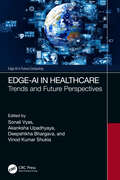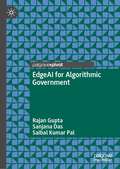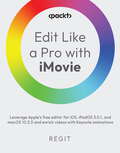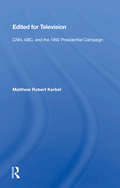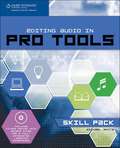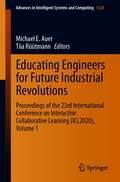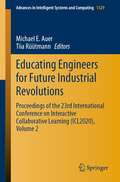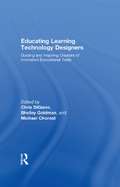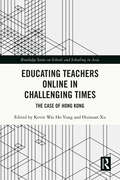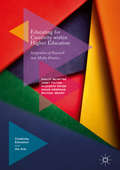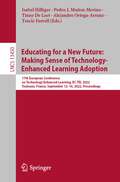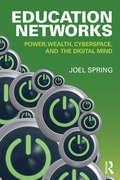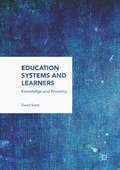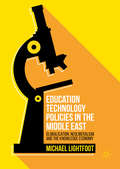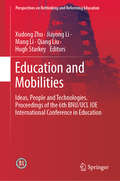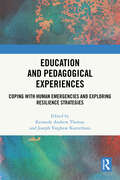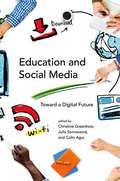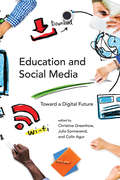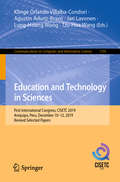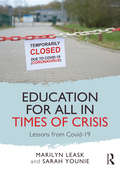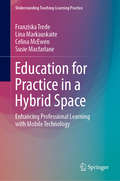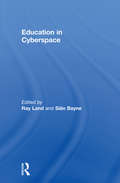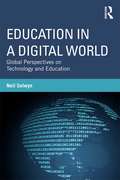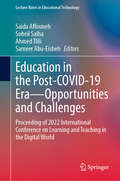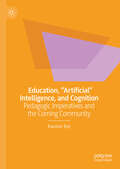- Table View
- List View
Edge-AI in Healthcare: Trends and Future Perspectives (Edge AI in Future Computing)
by Sonali Vyas, Akanksha Upadhyaya, Deepshikha Bhargava, and Vinod Kumar ShuklaThe book provides comprehensive research ideas about Edge-AI technology that can assist doctors in making better data-driven decisions. It provides insights for improving the healthcare industry by examining future trends, simplifying decision making and investigating structured and unstructured data.Edge-AI in Healthcare: Trends and Future Perspective is more than a comprehensive introduction to Artificial Intelligence as a tool in healthcare data. The book is split into five chapters covering the entire healthcare ecosystem. First section is introduction to Edge-AI in healthcare. It discusses data usage, modelling and simulation techniques as well as machine and deep learning approaches. The second section discusses the implementation of edge AI for smart healthcare. The topics discussed in this section include, AR/VR and cloud computing, big data management, algorithms, optimization, and IoMT techniques and methods. Third section covers role of Edge-AI in healthcare and the challenges and opportunities of the technologies. This section also provides case studies and discusses sustainability, security, privacy, and trust related to Edge-AI in healthcare. This book is intended to benefit researchers, academics, industry professionals, R & D organizations and students working in the field of healthcare, healthcare informatics and their applications.
EdgeAI for Algorithmic Government
by Rajan Gupta Saibal Kumar Pal Sanjana DasThe book provides various EdgeAI concepts related to its architecture, key performance indicators, and enabling technologies after introducing algorithmic government, large-scale decision-making, and computing issues in the cloud and fog. With advancements in technology, artificial intelligence has permeated our personal lives and the fields of economy, socio-culture, and politics. The integration of artificial intelligence (AI) into decision-making for public services is changing how governments operate worldwide. This book discusses how algorithms help the government in various ways, including virtual assistants for busy civil servants, automated public services, and algorithmic decision-making processes. In such cases, the implementation of algorithms will occur on a massive scale and possibly affect the lives of entire communities. The cloud-centric architecture of artificial intelligence brings out challenges of latency, overhead communication, and significant privacy risks. Due to the sheer volume of data generated by IoT devices, the data analysis must be performed at the forefront of the network. This introduces the need for edge computing in algorithmic government. EdgeAI, the confluence of edge computing and AI, is the primary focus of this book. It also discusses how one can incorporate these concepts in algorithmic government through conceptual framework and decision points. Finally, the research work emphasizes some design challenges in edge computing from applications viewpoint. This book will be helpful for data engineers, data scientists, cloud engineers, data management experts, public policymakers, administrators, research scholars and academicians.
Edit Like a Pro with iMovie: Leverage Apple's free editor for iOS, iPadOS, and macOS and enrich videos with Keynote animations
by A01 RegitA comprehensive guide to making the most of Apple's entry-level editing software—from the basics of editing to using iLife and open source apps to create unique non-fiction videosKey FeaturesLearn editing principles as you assemble coherent and concise videosMaster basic editing tools by importing, assembling, reframing, and embellishing footage with overlays and effectsCustomize animations and exports in iMovie and learn how to avoid the gotchas Apple won't tell you aboutBook DescriptionIt's not about having the shiniest tools; it's what you do with them. iMovie offers Apple users the ease of creating engaging videos using the free video editing application's support for macOS, iOS, and iPadOS devices. Complete with step-by-step tutorials for essential tools and concepts and explanations for why you should use them, this practical guide to iMovie will leave you well-prepared for the world of post-production. This book begins with an introduction to some of the core principles of editing. You'll learn how to easily make your videos coherent and concise and flex your creative muscles with Magic Movie and the Storyboard mode. Once you grasp how to use iMovie's full-blown Movie modes for mobile devices and macOS, you'll be able to use simple editing tools to deliver effective videos from import to export. Finally, you'll explore Keynote for creating custom titles and animations and building a personal visual brand that makes your videos uniquely yours. By the end of this iMovie book, you'll be on your way to becoming a creative problem-solver, using iMovie and other free apps to create high-quality, engaging videos for projects with different visual and technical requirements.What you will learnSoak up the principles of editing—coherence, conciseness, and adding meaningUse iMovie's Magic Movie and Storyboard tools to create simple, themed videosNavigate movie mode for iOS, iPadOS, and macOS and create videos without a templateImprove the viewing experience with overlays and use keyframes for smooth animationsCreate custom titles and animations using KeynoteUse open source software to transcode your exports for different platforms and requirementsIdentify the most common problems with iMovie and how to avoid themWho this book is forIf you have an Apple device and have to make a video for work or school, this book is where to turn. Suitable even for absolute beginners, this book includes simple, progressive guides to help you master editing principles and employ iMovie to create simple but effective videos to inform, educate and entertain your colleagues, friends, and family. For more advanced users such as YouTubers and other online content creators, this book contains valuable tips on how to stamp unique identity and brand USPs into videos.
Edited For Television: Cnn, Abc, And The 1992 Presidential Campaign
by Matthew Robert KerbelThis book discusses the words and pictures that constituted coverage of the 1992 presidential campaign on ABC and CNN. It addresses the implications of the news product for the viewing audience and the impact of the forces that create television news on the political system.
Editing Audio in Pro Tools: Skill Pack
by Michael WhiteEditing audio is one of the most important and often one of the least understood and most confusing functions of any DAW. However, it is also a function to which Pro Tools is particularly well suited. Editing Audio in Pro Tools: Skill Pack is your key to demystifying and mastering all of the audio editing tools available in Pro Tools. This unique book/CD-ROM learning tool provides an interactive and hands-on method for learning the art of editing audio in Pro Tools. Unlike other books with companion discs, the source files on your Skill Pack CD-ROM are an essential part of the book's tutorials-they are not there as mere examples; they are the building blocks from which you'll construct the projects. The result is a fully integrated learning experience. You'll learn by applying the skills you've been taught through real-life experience. By the end of the book, you'll have a fundamental understanding of the design and philosophy of editing audio in Pro Tools, you'll be able to work faster, and you'll know how to avoid common pitfalls and mistakes. Editing Audio in Pro Tools: Skill Pack truly has something for users of every skill level. Whether you are already a seasoned engineer looking to refine your editing skills, are switching to Pro Tools from another recording application, or are a songwriter or musician looking to make sense of this professional-level DAW, Editing Audio in Pro Tools: Skill Pack is sure to help you improve your projects. Beginners can progress from the start of the book to the end to get a comprehensive look at the entire Pro Tools editing system, and more advanced users can skip directly to a chapter that focuses on a particular editing feature they want to study-the source files on the CD are set up so that you don't necessarily need to start from the beginning. So what are you waiting for? Better audio editing skills will never be easier to attain!
Educating Engineers for Future Industrial Revolutions: Proceedings of the 23rd International Conference on Interactive Collaborative Learning (ICL2020), Volume 1 (Advances in Intelligent Systems and Computing #1328)
by Michael E. Auer Tiia RüütmannThis book contains papers in the fields of collaborative learning, new learning models and applications, project-based learning, game-based education, educational virtual environments, computer-aided language learning (CALL) and teaching best practices.We are currently witnessing a significant transformation in the development of education and especially post-secondary education. To face these challenges, higher education has to find innovative ways to quickly respond to these new needs. There is also pressure by the new situation in regard to the Covid pandemic.These were the aims connected with the 23rd International Conference on Interactive Collaborative Learning (ICL2020), which was held online by University of Technology Tallinn, Estonia from 23 to 25 September 2020. Since its beginning in 1998, this conference is devoted to new approaches in learning with a focus on collaborative learning. Nowadays the ICL conferences are a forum of the exchange of relevant trends and research results as well as the presentation of practical experiences in Learning and Engineering Pedagogy. In this way, we try to bridge the gap between ‘pure’ scientific research and the everyday work of educators. Interested readership includes policymakers, academics, educators, researchers in pedagogy and learning theory, school teachers, learning industry, further and continuing education lecturers, etc.
Educating Engineers for Future Industrial Revolutions: Proceedings of the 23rd International Conference on Interactive Collaborative Learning (ICL2020), Volume 2 (Advances in Intelligent Systems and Computing #1329)
by Michael E. Auer Tiia RüütmannThis book contains papers in the fields of engineering pedagogy education, public–private partnership and entrepreneurship education, research in engineering pedagogy, evaluation and outcomes assessment, Internet of Things & online laboratories, IT & knowledge management in education and real-world experiences. We are currently witnessing a significant transformation in the development of education and especially post-secondary education. To face these challenges, higher education has to find innovative ways to quickly respond to these new needs. There is also pressure by the new situation in regard to the Covid pandemic. These were the aims connected with the 23rd International Conference on Interactive Collaborative Learning (ICL2020), which was held online by University of Technology Tallinn, Estonia from 23 to 25 September 2020. Since its beginning in 1998, this conference is devoted to new approaches in learning with a focus on collaborative learning. Nowadays the ICL conferences are a forum of the exchange of relevant trends and research results as well as the presentation of practical experiences in Learning and Engineering Pedagogy. In this way, we try to bridge the gap between ‘pure’ scientific research and the everyday work of educators. Interested readership includes policymakers, academics, educators, researchers in pedagogy and learning theory, school teachers, learning industry, further and continuing education lecturers, etc.
Educating Learning Technology Designers: Guiding and Inspiring Creators of Innovative Educational Tools
by Michael Chorost Shelley Goldman Chris DiGianoWhat knowledge and skills do designers of learning technologies need? What is the best way to train them to create high-quality educational technologies? Distilling the wisdom of expert instructors and designers, this cutting-edge guide offers a clear, accessible balance of theory and practical examples. This cutting-edge guide: synthesizes learning, instructional design, and educational technology perspectives on learning-centered technology — highlighting how interdisciplinary work is driving the fields of the learning sciences and technology design and development offers helpful resources for both faculty and students — including descriptions of a variety of successful courses in learning technology design, examples of student work with commentary by instructors and students, and discussions of "lessons learned" in course development includes a "To the Student" chapter that speaks in plain language about what is exciting and challenging about creating technology for kids Directed to university instructors working with students on developing educational software projects and to managers leading learning technologies development teams, this book is a valuable resource for guiding and inspiring the next generation of designers of learning technologies.
Educating Teachers Online in Challenging Times: The Case of Hong Kong (Routledge Series on Schools and Schooling in Asia)
by Yung, Kevin Wai Ho Huixuan XuThis edited collection documents the challenges experienced by teacher educators, in-service teachers and student teachers in Hong Kong triggered by protests, civil unrest and the global outbreak of the COVID-19 pandemic, and identifies innovative practices in curriculum, pedagogy and assessment that have enabled them to overcome the challenges in online teaching. It offers implications for teacher professional development through reflective practices and the enhancement of the scholarship of teaching and learning in the teacher education sector in Hong Kong and beyond. Teaching and learning in various education sectors in Hong Kong experienced unprecedented challenges starting in late 2019. The suspension of face-to-face teaching resulted in the reliance on e-technology and online teaching and learning. Many teachers and students felt unprepared and thus experienced emotional distress. However, the challenges opened up opportunities for teacher educators to revamp their instructional and assessment practices to cater for students’ learning needs in the online environment. The chapters are split into five sections, covering the situation of teacher education in challenging times, stakeholders’ experiences and challenges in teaching and learning, curriculum and pedagogical innovations, assessment and feedback practices and finally scholarship of teaching and learning. The book will be of particular interest to those who are committed to professional development through strengthening their reflective practice, online teaching and the scholarship of teaching and learning. It will also be an ideal text for education scholars and postgraduate students in curriculum planning, innovative online pedagogies and assessment practices in teacher education and the broader higher education context.
Educating for Creativity within Higher Education: Integration of Research into Media Practice (Creativity, Education and the Arts)
by Susan Kerrigan Phillip McIntyre Janet Fulton Elizabeth Paton Michael MeanyThis book provides innovative insights into how creativity can be taught within higher education. Preparing students for employment in a dynamic set of global creative industries requires those students to not only be resilient and entrepreneurial, but also to be locally focused while being globally aware. Therefore it is imperative that they acquire a thorough understanding of creative processes and practice as they try to keep pace with worldwide digital trends. As the creation of media messages is a fundamental aspect of global creative industries, and that numerous concerns practitioners face are based upon a certain understanding of creativity, the authors propose an exploration of what creativity is in terms of research, and then apply it pedagogically. Drawing on extensive empirical research, the authors pose the thought-provoking question of whether creativity can be taught. This volume will be of interest to both students and scholars of creativity and higher education as well as to creatively-based practitioners more widely.
Educating for a New Future: 17th European Conference on Technology Enhanced Learning, EC-TEL 2022, Toulouse, France, September 12–16, 2022, Proceedings (Lecture Notes in Computer Science #13450)
by Tinne De Laet Isabel Hilliger Alejandro Ortega-Arranz Pedro J. Muñoz-Merino Tracie FarrellThis book constitutes the proceedings of the 17th European Conference on Technology Enhanced Learning, EC-TEL 2022, held in Toulouse, France, in September 2022.The 30 research papers and 31 demo and poster papers presented in this volume were carefully reviewed and selected from 109 submissions. Chapter “Learners’ Strategies in Interactive Sorting Tasks” is available open access under a CC BY 4.0 license.
Education Networks: Power, Wealth, Cyberspace, and the Digital Mind (Sociocultural, Political, and Historical Studies in Education)
by Joel SpringEducation Networks is a critical analysis of the emerging intersection among the global power elite, information and communication technology, and schools. Joel Spring documents and examines the economic and political interests and forces —including elite networks, the for-profit education industry, data managers, and professional educators — that are pushing the use of ICT for online instruction, test preparation and tutoring, data management, instructional software packages, and more , and looks closely at the impact this is having on schools, students, and learning. Making a distinction between "mind" (as socially constructed) and "brain" (as a physiological entity), Spring draws on recent findings from comparative psychology on the possible effects of ICT on the social construction of the minds of students and school managers, and from neuroscience regarding its effect on students’ brains. Throughout, the influence of elite networks and powerful interest groups is linked to what is happening to children in classrooms. In conclusion Spring offers bold suggestions to change the course of the looming technological triumph of ICT in the "brave new world" of schooling.
Education Systems and Learners
by David ScottThis book explores curricular, teaching and learning practices in schools in England and in higher education institutions, and considers the damaging effects of the Research Excellence Framework (REF) for UK higher education institutions, international comparative assessment systems such as the Programme for International Student Assessment (PISA), and broadly, how educational judgements are now made about educational matters. David Scott criticizes the implementation of neo-liberal policies and practices in education systems round the world, management and control system approaches, and empiricist/positivist research agendas. The book offers an account of a new education model, which is directly in opposition to agendas currently supported by the right of the political spectrum. It will be of interest to teachers and students of education, the education research community, practising and trainee teachers, and education policy makers.
Education Technology Policies in the Middle East
by Michael LightfootThis book explores the potential educational technologies have for transforming education in the Middle East. Although technology has increasingly become a part of classrooms around the globe over recent decades, its application in classrooms in the MENA region remains underused and this book draws on a case study from the Arabian Gulf to examine the beneficial impact technologies have on teaching and learning. The book identifies the many social and cultural pressures that prevent government technology policies to be implemented in the way that the international community would find recognisable and acceptable and how education policy from the Global North is transplanted into a separate context without considering the different requirements. The study seeks to address the ways in which educational technology policy in government schools plays a part in the enactment of education reforms and how government policy aspirations are played out in practice. iv>
Education and Mobilities: Ideas, People and Technologies. Proceedings of the 6th BNU/UCL IOE International Conference in Education (Perspectives on Rethinking and Reforming Education)
by Xudong Zhu Mang Li Qiang Liu Hugh Starkey Jiayong LiThis book gathers selected original papers presented at the Sixth Beijing Normal University - University College London, Institute of Education International Conference in Education, a biennial event organised in partnership between this two universities. Readers will find a wealth of papers and reports on research involving schools and the initial and professional development of teachers, revealing links between research, policy and practice, while also analyzing key themes in education, including public goals and policies, pedagogy, curricula, organisation, resources and technologies, and institutional effectiveness. An essential guide for anyone who wishes to understand the main issues involved in mobilities of ideas, people and technology in the field of education, the book offers an extensive introduction, and can also be used as a resource for empirical and conceptual research into related issues.
Education and Pedagogical Experiences: Coping with Human Emergencies and Exploring Resilience Strategies
by Joseph Varghese Kureethara Kennedy Andrew ThomasThis book analyses how the educational ecosystem undergoes a paradigm shift during human emergencies – be it natural, manmade, environmental, ethnic or a global pandemic like COVID-19. It discusses varied approaches, experiences, and the steadfast desire to share information, demonstrating the value of teaching and learning in difficult conditions.This volume aims to build resilience and inspire young minds to persevere through challenging times. It explores the continuity of education during emergencies, various teaching and learning approaches, and the importance of maintaining a resilient attitude. Each addresses the cultural and locational specifics of emergencies, illustrating how education and pedagogy have made a global impact. They also examine a specific aim, enriched by cultural, geographical, and human variables, and how education and pedagogy aim to resolve these concerns.This book would be useful to students, researchers and teachers working in Education, Environmental Science and Disaster Management, Political Science, Public Administration, International Relations, Peace Education, Psychology and Cognitive Science, Neuroscience, Sociology and Social work. It would also be an invaluable companion to practicing pre-service and in-service teachers and their trainers, policy makers, professionals from government and non-government organizations working in education and social development.
Education and Social Media: Toward a Digital Future
by Colin Agur Christine Greenhow Julia SonnevendHow are widely popular social media such as Facebook, Twitter, and Instagram transforming how teachers teach, how kids learn, and the very foundations of education? What controversies surround the integration of social media in students' lives? The past decade has brought increased access to new media, and with this new opportunities and challenges for education. In this book, leading scholars from education, law, communications, sociology, and cultural studies explore the digital transformation now taking place in a variety of educational contexts. The contributors examine such topics as social media usage in schools, online youth communities, and distance learning in developing countries; the disruption of existing educational models of how knowledge is created and shared; privacy; accreditation; and the tension between the new ease of sharing and copyright laws. Case studies examine teaching media in K--12 schools and at universities; tuition-free, open education powered by social media, as practiced by the University of the People; new financial models for higher education; the benefits and challenges of MOOCS (Massive Open Online Courses); social media and teacher education; and the civic and individual advantages of teens' participatory play.ContributorsColin Agur, Jack M. Balkin, Valerie Belair-Gagnon, danah boyd, Nicholas Bramble, David Buckingham, Chris Dede, Benjamin Gleason, Christine Greenhow, Daniel J. H. Greenwood, Jiahang Li, Yite John Lu, Minhtuyen Mai, John Palfrey, Ri Pierce-Grove, Adam Poppe, Shai Reshef, Julia Sonnevend, Mark Warschauer
Education and Social Media: Toward a Digital Future (The John D. and Catherine T. MacArthur Foundation Series on Digital Media and Learning)
by Colin Agur Christine Greenhow Julia SonnevendLeading scholars from a variety of disciplines explore the future of education, including social media usage, new norms of knowledge, privacy, copyright, and MOOCs.How are widely popular social media such as Facebook, Twitter, and Instagram transforming how teachers teach, how kids learn, and the very foundations of education? What controversies surround the integration of social media in students' lives? The past decade has brought increased access to new media, and with this new opportunities and challenges for education. In this book, leading scholars from education, law, communications, sociology, and cultural studies explore the digital transformation now taking place in a variety of educational contexts. The contributors examine such topics as social media usage in schools, online youth communities, and distance learning in developing countries; the disruption of existing educational models of how knowledge is created and shared; privacy; accreditation; and the tension between the new ease of sharing and copyright laws. Case studies examine teaching media in K–12 schools and at universities; tuition-free, open education powered by social media, as practiced by the University of the People; new financial models for higher education; the benefits and challenges of MOOCS (Massive Open Online Courses); social media and teacher education; and the civic and individual advantages of teens' participatory play.ContributorsColin Agur, Jack M. Balkin, Valerie Belair-Gagnon, danah boyd, Nicholas Bramble, David Buckingham, Chris Dede, Benjamin Gleason, Christine Greenhow, Daniel J. H. Greenwood, Jiahang Li, Yite John Lu, Minhtuyen Mai, John Palfrey, Ri Pierce-Grove, Adam Poppe, Shai Reshef, Julia Sonnevend, Mark Warschauer
Education and Technology in Sciences: First International Congress, CISETC 2019, Arequipa, Peru, December 10–12, 2019, Revised Selected Papers (Communications in Computer and Information Science #1191)
by Lung-Hsiang Wong Jari Lavonen Klinge Orlando Villalba-Condori Agustín Aduríz-Bravo Tzu-Hua WangThis book constitutes the refereed proceedings of the First International Congress on Education and Technology in Sciences, CISETC 2019, held in Arequipa, Peru, in December 2019. The 12 full papers presented in the volume were carefully reviewed and selected from 96 submissions. The papers are focused on the two main topics: pedagogical practice in the sciences, focused specificaly on science education; and complementary aspects of science teaching, which considers all the elements that can contribute to science education.
Education for All in Times of Crisis: Lessons from Covid-19
by Marilyn Leask Sarah YounieThis book is a response to the loss of learning experienced by children and young people during the Covid-19 crisis. It examines the measures which were taken to fix the disruption of education and their limitations particularly in reaching marginalised groups. Drawing on data and experiences from around the world, the book examines education systems as ecosystems with interdependencies between many different components which need to be considered when change is contemplated. Chapters explore the challenges involved ensuring continuity of education for all learners in times of crisis and disruption and set out practical solutions that are relevant when preparing for natural disasters and disasters caused by humans as well as for climate change challenges and future pandemics. The focus throughout is on building the sustainability of learners’ education into education systems to ensure educational continuity for all learners in times of disruption and crisis. Including tools for planning, prompts for reflection, and future possibilities to consider, Education for All in Times of Crisis will be valuable reading for school leaders, educators and policy makers.
Education for Practice in a Hybrid Space: Enhancing Professional Learning with Mobile Technology (Understanding Teaching-Learning Practice)
by Franziska Trede Lina Markauskaite Celina McEwen Susie MacfarlaneThis book presents a mobile technology capacity building framework that offers academics, students, and practitioners involved in workplace education a deeper understanding of, and practical guidance on, how mobile technology can enhance professional learning. Approaching professional and workplace learning as a hybrid space in which work, learning and technology meet, the book discusses the value of mobile technology in shaping professional education, particularly during student placements.The framework focuses on staying professional and safe, considering issues of time and place, planning learning activities, initiating dialogue, networking, creating learning opportunities on-the-go, and deepening reflection. It is designed to assist students and their educators to use mobile technology knowledgeably and responsibly, and to help bridge the gap between university learning and workplace practice.This book also contributes to a better understanding of the interconnectedness between learning, practice and technology. It demonstrates how to enhance learning and working with mobile technology by drawing on two perspectives: the ‘professional-plus’ and the ‘deliberate professional’.
Education in Cyberspace
by Ray Land Siân BayneThe use of online learning environments is now widespread, and there is a wealth of literature providing practical advice on how to teach online, develop courses and ensure effective pedagogical practice. What has been frequently overlooked is the insight offered by cyberspace theory, which considers broader social, cultural and theoretical contexts within which new technologies and learning models are situated. This book provides a fresh perspective on current thinking in e-learning. It challenges orthodox assumptions about the role of technology in the teaching and learning of the future, and explores more varied and wider-reaching conceptual frameworks for learning in cyberspace. Featuring the contributions of respected and experienced experts with a wide range of perspectives, Education in Cyberspace will be valued by anyone closely involved in the theory of e-learning and education.
Education in a Digital World: Global Perspectives on Technology and Education
by Neil SelwynDrawing on a wealth of theoretical and empirical work, Education in a Digital World tackles a number of pressing questions, such as, how are ‘global’ trends in educational technology refracted through national policies and processes? How exactly are educational technologies linked to issues of global economics and the fortunes of national and international economies? To what extent are digital technologies implicated in the commercialisation, marketization and commodification of education? These questions, and others, are addressed throughout eight wide-ranging chapters, which consider topics such as the national policy strategies of countries across North and South America, Europe and East Asia, the educational technology portfolios of international organizations such as the United Nations and Microsoft, as well as the role of education and technology in international development and the on-going efforts to provide ‘one laptop per child’ across low-income regions and countries. Through these examples Selwyn develops a detailed analysis of education, technology and globalisation, drawing together arguments and debates from various academic perspectives. Written in a detailed but accessible manner, this is an essential book for anyone wishing to gain a better understanding of the role of education and technology in contemporary globalised society.
Education in the Post-COVID-19 Era—Opportunities and Challenges: Proceeding of 2022 International Conference on Learning and Teaching in the Digital World (Lecture Notes in Educational Technology)
by Ahmed Tlili Saida Affouneh Soheil Salha Sameer Abu-EishehThis book offers authors’ practices, initiatives, and experiences in sustaining their education during the pandemic from different countries, contexts, and political situations. It provides a future prediction for the education system in the world due to the transformation that happened in the post-COVID-19 era. Each chapter of the book is expected to shed light on different countries describing their education system in the past, present, and future. The readers of the book will be able to learn, compare, and analyze the differences and similarities between the educations offered to learners around the world.The book also presents a new model of e-learning that will help learners, teachers, and educational systems to participate in achieving sustainable development goals. The book introduces several scenarios of types of learning and how to plan, design, and implement them in F2F and online environments.
Education, "Artificial" Intelligence, and Cognition: Pedagogic Imperatives and the Coming Community
by Kaustuv RoyThis book initiates fresh pedagogic thinking on the nature of intelligence and human potentiality in the midst of a rising panic over so-called artificial intelligence. At the rate of current advancement, entire social and cultural landscapes including education and work are going to change in unprecedented ways in the near future. In light of these developments, the author sets out to critically assess the role of education in creating the capacity to distinguish between machinic &“intelligence&” and organic intelligence, thus helping us move from passive acceptance to active becoming.
